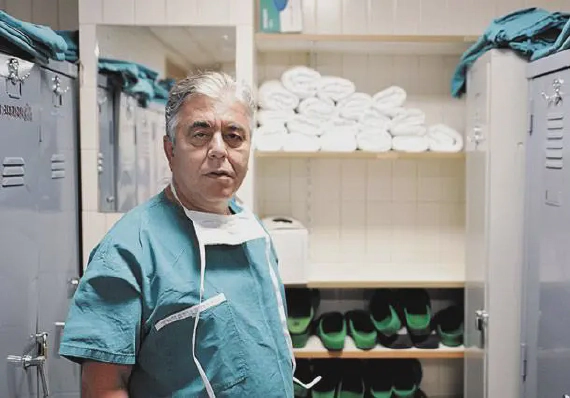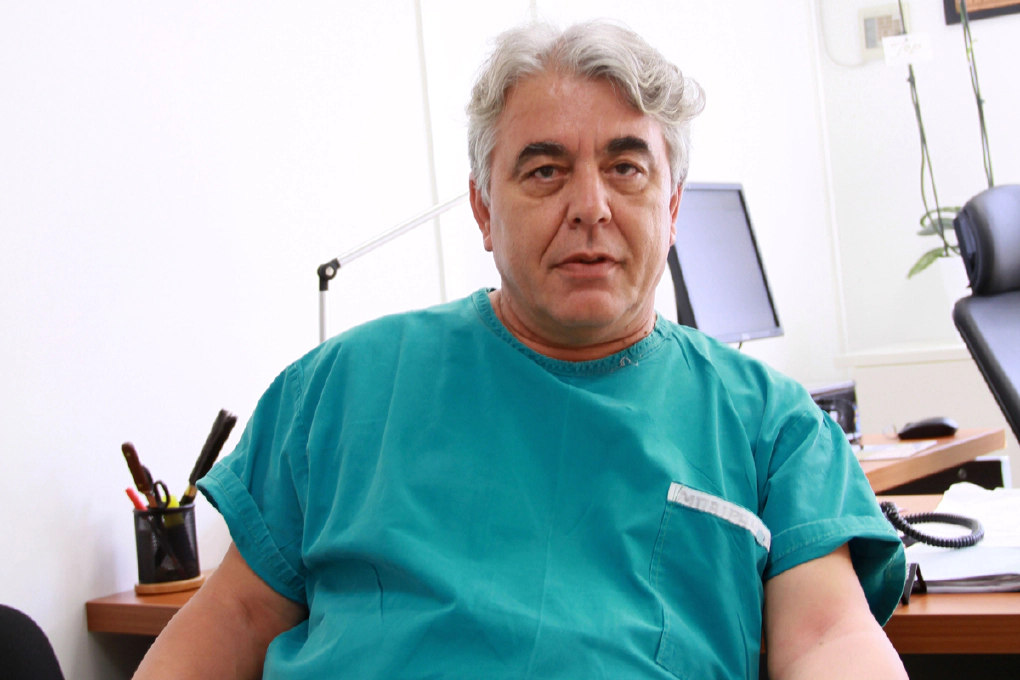
I'm here to work, not to make clients (Translation)
It reminds me of that song by Dalaras that says “who saw a boat on Helmos, in Metsovo a boat”. I knew that …

Friday 19 February 2016. At the “Sismanoglio” hospital, which has been designated as an examination centre for cardiac surgery residents, two candidates are attending the examination in order to be judged for the title of medical specialty. The age gap between the two doctors - one is about in the middle of his third decade of life and the other in his early seventh! - hardly goes unnoticed. The written and then the oral examination flows smoothly, with the three examiners, all NHS cardiac surgeons, controlling the process. Both candidates seem satisfied with their efforts, with the older candidate making no secret of his confidence in his excellent performance - demonstrated by the results shortly afterwards.
And it probably couldn’t have been otherwise: Because the examiner for the specialty of cardiac surgery was Mr. Andreas Bairaktaris, former deputy director of the cardiac surgery center of Rhineland-Westphalia, Bad Oeynhausen Universitatsklinik Bochum, one of the largest cardiac surgery centers in Europe. The doctor has more than 10,000 open heart operations to his credit, leading a team of 90 surgeons. At the centre, where he worked until 2010, around 4,500 operations and over 100 heart transplants are performed annually. From 2010 to 2015, Mr. Bairaktaris was employed at the Onassis Hospital as the director of the First Cardiac Surgery Clinic - at the end of his contract he had performed 1,461 cardiac surgeries. However, for this renowned scientist, participation in the Ministry of Health’s speciality examinations was a one-way street. Stuck in a bureaucratic labyrinth, in the midst of the Central Health Council and the Directorate of Professions of the Ministry of Health, the Ministry of Education, the Region of Attica, the Medical Associations of Athens and Westphalia-Lippe, with numerous documents circulating for months on the subject of Mr. Bairaktaris passed his exams and completed a labyrinthine, obstacle-filled path that tested his professional and personal limits. The “starting signal” for this journey was given with a complaint against him in the spring of 2015 to the Athens Medical Association (IBA), according to which Mr. Bairaktaris does not have the specialty of a cardiac surgeon. The IAA calls on the doctor to refrain from performing any medical act that falls under the scope of thoracic surgery until the issue is resolved.
He finds - with hindsight and in retrospect - that the complaint was anything but accidental at the time. “In December 2015, my tenure at the Onassis Hospital was due to be renewed, which did not happen as the complaint led me into an incredibly lengthy adventure, with many departments involved that barely examined the substance and blamed each other for the decision,” Mr. Bairaktaris tells THEMA. As he explains “the complaint was based on the change of the relevant EU directive on the automatic recognition of doctors’ specialties between EU member states. In Greece there is no separate cardiac surgery specialty. Heart operations are performed by thoracic surgeons. In Germany the two specialities are separate. Under the European Directive of 2001, cardiac surgery in Germany corresponded to thoracic surgery in Greece and was automatically recognised. However, following the renewal of the EU Directive in 2005, thoracic surgery in Greece now corresponds only to thoracic surgery in Germany. And recognition is automatic only between these two specialities. Cardiac surgery, according to the new Directive, can only be recognised after an assessment of the doctor’s formal qualifications. Only in Greece, as he found out with bitterness, nobody wanted to bother with the assessment of the formal qualifications and ultimately with the recognition of the cardiosurgical speciality of the doctor.
In May 2015, Mr. Bairaktaris in his application to the Region of Attica, specifically to the Directorate of Public Health and Social Care, requested the recognition of the specialty of Cardiac Surgery under the provisions of Directive 2001/19/EC and PD 38/2004, which explicitly equate the specialty of cardiac surgery in Germany with the specialty of thoracic surgery in Greece. At the end of June 2015, the Region requests the doctor to provide “a certificate from a competent institution in Germany officially translated stating the date of application of the Community Directive 2005/36/EC in order to grant you a title of specialisation in thoracic surgery”.
Indeed, the doctor submitted a certificate from the Medical Association of Westphalia-Lippe according to which the Directive was transposed into German national law in 2012. In two opinions, in July and September of that year, the Regional Legal Office took the view that the administration was obliged to recognise the specialisation which he had acquired in Germany.
However, the deputy head of the Regional Public Health Directorate did not accept the opinions of the legal service. In December 2015 he ruled that the doctor’s speciality could not be automatically recognised. He even referred the 60-year-old cardiac surgeon to the Professional Qualifications Recognition Council (PRC) of the Ministry of Education and the Central Health Council (CCHC) of the Ministry of Health. Small detail: the CACP has been abolished when the referral is made by the District …
For its part, the KESY where the doctor has been addressed, responds but “throwing” the ball of responsibility again to the Region. Specifically, the KESY responds that the same is only an advisory body of the Ministry and that the Region has the competence to recognize a specialty title.
After a barrage of correspondence with departments in Greece and Germany, the Region in November 2015 replies that “our department considers that at the present time and within the scope of its competence, it is not possible to automatically recognize the German specialty of Cardiac Surgery as the Greek specialty of Thoracic Surgery”.
Mr Bairaktaris is disappointed but does not give up. He has already decided on his next step: He will take the medical specialty exam. He has decided to take his final exam. He has decided to take the exam. “I missed Greece, even more in its crisis, I wanted to return and, with what little I can help, to see the light of my homeland again,” he said in an interview in 2011.
What is certain is that he did not only see the light of his homeland. He is rushing to submit his application for the December inquiry, but again obstacles are rising before him. The Directorate for Health Professionals of the Ministry of Health is asking Mr Bairaktaris for a certificate that the Bad Oeynhausen Hospital is recognised as a specialist hospital, a certificate for the time he spent as a specialist from 1/5/1992 to 30/9/1994 at the Herz und Diabetenzentrum Nordhein - Westfalen and a certificate that this centre can give specialist training. The documents relating to Mr Bairaktaris are available for all three requests from the service, with positive replies.
He did not make the 2015 examination. With the documents certifying that Mr. Bairaktaris has completed in Germany 3 years of training in General Surgery and 4 years of training in Thoracic Surgery, including two in Thoracic Surgery and two in Heart and Vascular Surgery, the doctor submits his request to participate in the specialty examination in Greece in February 2016. Two months later he obtains his cardiac surgery residency in Greece. He has “missed” the renewal of his tenure at the Onassis Hospital. But it is enough for him that the Onassis Heart Surgery Center sends its, to be managed, attendings to the Bad Oeynhausen Universitatsklinik Bochum for further training…

It reminds me of that song by Dalaras that says “who saw a boat on Helmos, in Metsovo a boat”. I knew that …

Cardiologist Andreas Bairaktaris, Doctor of Medicine at the University of Bochum, is currently Director of …